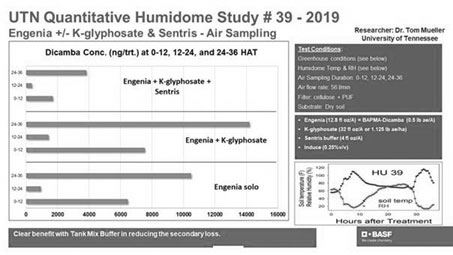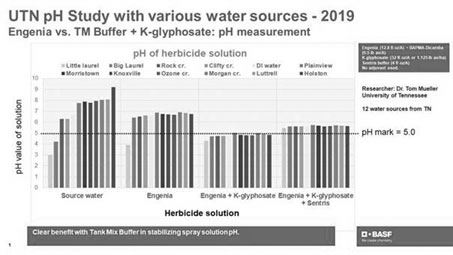New Dicamba Labels Mandate Adding Volatility Reducing Agent
DR. LARRY STECKEL AND DR. TOM MUELLER
JACKSON, TENN.
As most know the EPA approved a new five-year registration for Engenia, Tavium and XtendiMax to be used in Xtend cotton and soybean. The new registration has some new labeled directions on application of these herbicides. In a series of articles this winter, we will try to highlight the major label changes.
One of the new labeled requirements for these three herbicides is the addition of a volatility reducing agent (VRA). In the previous labels there was some wording on keeping the spray tank pH above 5. The reason for this is that spray tank pH below 5.0 can increase the likelihood of dicamba to volatilize into a gas hours after application. As we wrote last winter this can be a common problem because in applications where glyphosate is mixed in the tank with Engenia or XtendiMax our research suggested that the spray tank pH would most every time fall below 5.0.
Some applicators this spring regularly checked their spray tank pH and added typically a label-approved nutritional to increase the solution pH. The new label now makes it mandatory that a VRA be added to every tank load. The approved VRAs will soon be offered by a number of manufacturers.
This past winter we asked for access to the VRAs from Bayer and BASF so we could test them. BASF agreed to give us access. My colleague, Dr. Tom Mueller, tested their new product, trade name Sentris, for its effectiveness mitigating dicamba volatility. The results are below (Figure 1) and are encouraging as these data suggest that Sentris can decrease dicamba volatilization, in the first 36 hours after application, by about 70 percent in an Engenia + glyphosate tankmix.
You might ask that is good but what about tankmixtures using the water I mix with? To address this question the Tennessee Soybean Promotion Board sponsored a study where we pulled water randomly around the state. The natural water pH in water sources across the state are very diverse with some water sources with a pH near 3 and other locations above 9. Moreover, we have found from this research that water pH for any given location will change a least some throughout the year. The results from this research show that adding Engenia alone increases the tank pH. Adding glyphosate in with the Engenia in most cases reduces the pH below 5 and then adding Sentris raises the pH above 5, even for the location where the water source started near 3 (Figure 2).
We cannot speak for the other VRAs as we have no data, but the take home from these studies is that Sentris can help mitigate off-target dicamba applications. Finally, of all the new label changes on Engenia adding Sentris to every dicamba application, based on this research, could be the most impactful on keeping the herbicide in the target field. ∆
DR. LARRY STECKEL: Extension Weed Specialist, University of Tennessee
DR. TOM MUELLER: Professor of Weed Science, University of Tennessee

Figure 1.

Figure 2.